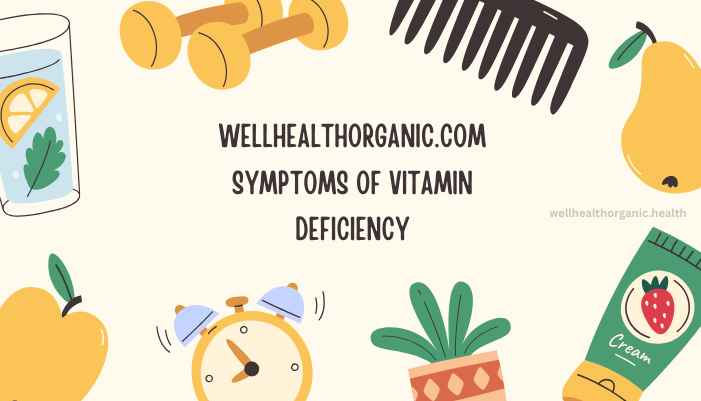Vitamins play a crucial role in keeping your body healthy and functioning properly. Unfortunately, vitamin deficiencies are more common than we think. They can cause a variety of symptoms that often go unnoticed or are mistaken for other issues. In this article, we’ll explore seven common symptoms of vitamin deficiency, how to identify specific deficiencies, and natural ways to prevent and fix them.
Why Vitamins Are Vital for Your Health
Vitamins are essential nutrients that help your body perform critical functions. They boost your immune system, support growth and development, and ensure proper functioning of your organs. Each vitamin has a specific role: Vitamin D strengthens bones, Vitamin C supports immunity, and Vitamin B12 improves energy levels, to name a few.
However, poor dietary habits, stress, and certain medical conditions can lead to deficiencies. If left untreated, these deficiencies may result in long-term health problems.
Here are 10 common symptoms of vitamin deficiency that you shouldn’t ignore:
- Fatigue and Weakness
Feeling tired or low on energy constantly could be a sign of deficiencies in Vitamin B12, iron, or Vitamin D. - Brittle Hair and Nails
Fragile, splitting hair or nails may point to a lack of biotin (Vitamin B7). - Muscle Cramps and Pain
Frequent cramps or muscle pain can indicate a deficiency in magnesium, potassium, calcium, or Vitamin D. - Dry or Flaky Skin
Skin problems, such as dryness or eczema, may result from low levels of Vitamin A, E, or omega-3 fatty acids. - Slow Wound Healing
Poor wound healing can be caused by insufficient Vitamin C, which is essential for collagen production. - Frequent Infections
A weakened immune system, making you prone to colds and infections, is often linked to low Vitamin C, D, or zinc. - Vision Problems
Difficulty seeing at night or eye dryness could be a symptom of Vitamin A deficiency. - Tingling in Hands or Feet
A lack of Vitamin B12 or B6 can cause nerve issues, resulting in tingling or numbness in extremities. - Mood Changes or Depression
Deficiencies in Vitamin D, B12, or omega-3 fatty acids may lead to anxiety, irritability, or depression. - Pale or Yellow Skin
Pale skin may indicate iron deficiency anemia, while yellowing of the skin and eyes could be related to low Vitamin B12.
Recognizing these symptoms early and addressing them with a balanced diet or supplements can significantly improve your health.
Spotting Specific Vitamin Deficiencies and Their Solutions
Vitamin C Deficiency
- Symptoms: Frequent colds, bleeding gums, and fatigue.
- How to Fix It: Include citrus fruits, strawberries, and bell peppers in your diet.
Vitamin D Deficiency
- Symptoms: Bone pain, muscle weakness, and fatigue.
- How to Fix It: Spend more time in the sun and eat foods like fortified milk, fatty fish, and egg yolks.
Iron and Vitamin B12 Deficiencies
- Symptoms: Weakness, pale skin, and shortness of breath.
- How to Fix It: Add red meat, leafy greens, and fortified cereals to your meals.
How to Prevent and Fix Vitamin Deficiency Naturally
1. Eat a Balanced Diet
Focus on consuming whole foods rich in vitamins and minerals. Include a variety of fruits, vegetables, lean proteins, whole grains, and healthy fats in your meals.
2. Don’t Discard Fruit and Vegetable Peels
Did you know the peels of fruits and vegetables are packed with nutrients? For example, apple and potato skins are rich in fiber, vitamins, and antioxidants.
3. Explore Plant-Based Nutrition
Plant-based diets are full of vitamins, minerals, and antioxidants. Eating more plant-based meals can benefit your overall health and help you meet your nutritional needs.
Top Organic Foods for Combating Deficiencies
Figs (Anjeer)
Figs are rich in calcium, magnesium, and antioxidants, making them a great choice for bone health and overall wellness.
Black Tea
Black tea contains antioxidants that can promote better immunity and heart health when consumed in moderation.
Protein-Rich Foods
Protein is essential for muscle repair and growth. Foods like eggs, lentils, and nuts can help you meet your daily protein requirements.
The Connection Between Deficiency and Lifestyle
Your lifestyle choices directly impact your nutritional status. For example:
- Sleep Hygiene: Poor sleep can reduce your body’s ability to absorb nutrients effectively. Ensure you’re getting 7-8 hours of quality sleep every night.
- Stress Management: Chronic stress can deplete essential nutrients. Practice relaxation techniques like meditation or yoga.
Conclusion
Vitamin deficiencies can significantly impact your health and quality of life, but they are often preventable and treatable. By recognizing the symptoms, such as fatigue, brittle hair, or frequent illnesses, you can take the necessary steps to restore your nutrient levels. A balanced diet rich in vitamins, minerals, and whole foods is the best way to maintain optimal health. Don’t ignore the signs your body is giving you—act early to avoid long-term health issues and embrace a healthier, more vibrant life.
FAQs
1. How can I know if I have a vitamin deficiency?
You might notice symptoms like fatigue, hair loss, or frequent illnesses. A blood test is the most accurate way to diagnose a deficiency.
2. Can vitamin deficiencies be reversed?
Yes, most deficiencies can be reversed by improving your diet and, if necessary, taking supplements as prescribed by a doctor.
3. What foods are best for preventing deficiencies?
Leafy greens, citrus fruits, nuts, seeds, dairy products, and lean meats are excellent choices.
4. How long does it take to recover from a vitamin deficiency?
Recovery time depends on the severity of the deficiency and your efforts to address it. It can take a few weeks to several months.
5. Should I take supplements?
Supplements can help if you’re unable to meet your nutritional needs through diet alone. Consult a healthcare professional before starting any supplement.



